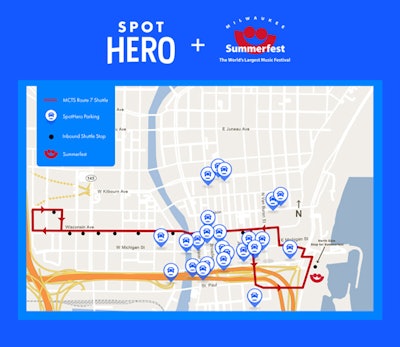
In mid-September, SpotHero launched a new service to help planners provide parking for their guests. SpotHero for Events allows guests to find and reserve parking in advance through a mobile app and website. The system operates in real time to reflect street closures and construction. Planners can embed the custom parking landing page on their event’s website and in emails and other communication materials so guests can reserve a spot with one click. The system is currently available in 15 cities across the United States, including Chicago, Los Angeles, New York, and Washington, D.C.
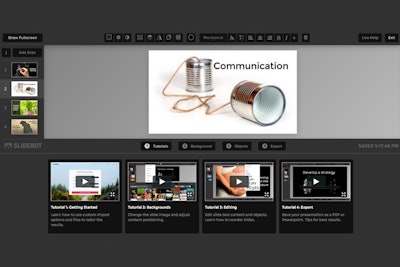
SlideBot is a tool to help people create engaging presentations. Users either type content directly in SlideBot or import an existing PowerPoint or Word file. The system uses “natural language processing” to understand the presentation’s content and then searches its database of more than 25 million images to find those that are most appropriate. After identifying images, SlideBot uses thousands of design rules to place the text on the images. Users can also choose from more than 800 icons and symbols to customize the presentation. Users can present directly from SlideBot or they can export a fully editable version to Powerpoint. The system costs $19 per month or $179 per year.
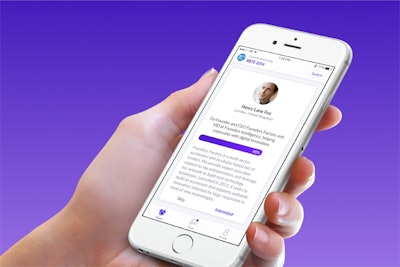
Grip is an app to facilitate networking at events. Similar to dating apps, Grip requires both parties to express an interest before connecting. Once two people both express an interest, that triggers a “handshake” in the app and the two people can then communicate through in-app messages to share ideas and arrange a meeting. Users can log in with their LinkedIn or Facebook accounts and also add a description about their interests. The system’s algorithm uses that data to recommends people to meet. Users can also join any of the more than 500 networking communities that exist within the app. In addition to the Grip app, the company also offers a white label version for events and planners can also integrate Grip’s API into their existing app or website.
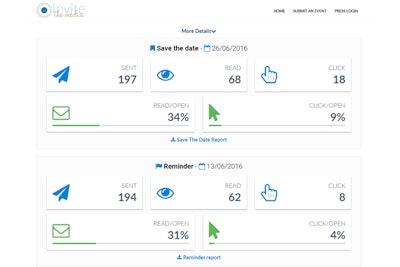
Invite the Media is an online system to get journalists, bloggers, and influencers to an event. Planners fill out a form to indicate the date, time, location, and registration page of the event as well as details about the type of event (a conference, trade show, or fund-raiser, to name a few examples) and social media links and hashtags. The system then selects who in its database of more than 1 million media representatives in 150 countries would be suitable to receive the information. Reporters opt in to the media list so when an event matches their profile of interests it also triggers an invitation. The system sends reminder emails and provides tracking and metrics at the conclusion of each campaign. The company reports it has sent more than 450,000 invitations to date. Pricing ranges from $79 to $499.

Swoogo is a comprehensive planning system to manage an event’s website, registration, and marketing. Users choose a theme and drag-and-drop content widgets to create the event website. The system’s setup wizard can be used to create the registration form, designate registrant types, and add sessions. Pricing is based on how many people have access to create and edit events, ranging from $500 for one “full user,” to $2,000 for eight. All plans can be used for an unlimited number of events and registrations.
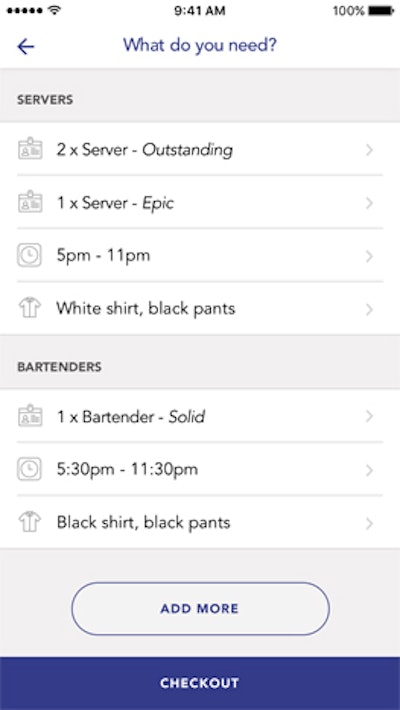
Jitjatjo is an app to facilitate on-demand temporary staffing for venues, caterers, events, and more. When a user requests staffing, the app handles the entire process from hiring through payroll. Requests can be made as late as an hour before a scheduled shift, for examples to replace people who have called in sick or simply don’t show up. The app analyzes requests and selects talent based on their experience, location, skills, availability, history, and ratings. Users can also request specific attire, include details regarding an assignment, and send messages in the app without having to share their contact information. Jitjatjo launched October 18. Currently, the service is only available in New York, but the company is making plans to expand to other cities.
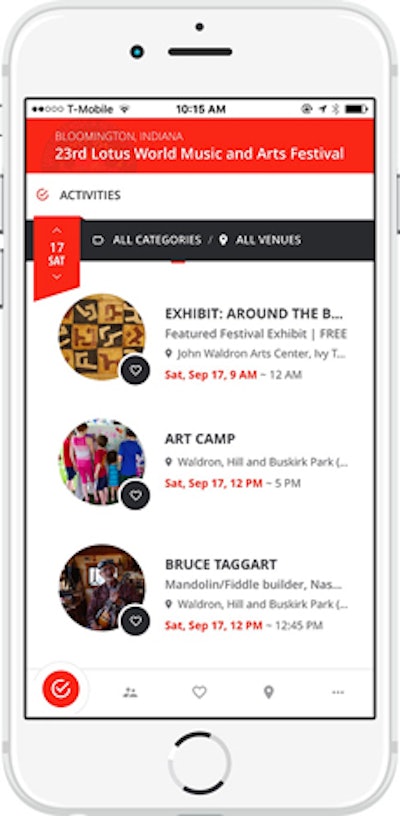
Rendezville is an app that launched in April, targeted to small-to-medium-size festivals, conferences, and events. The system operates as a Web app, meaning users don’t have to download it to their phones. Instead, they choose “add to home screen” and a link to the app will reside there. Planners can customize the look of the app so it matches their events. Content can include schedules, maps, bios, photos, and links to SoundCloud, YouTube, and social media. Organizers can test the interface for free, and only pay if they decide to publish.
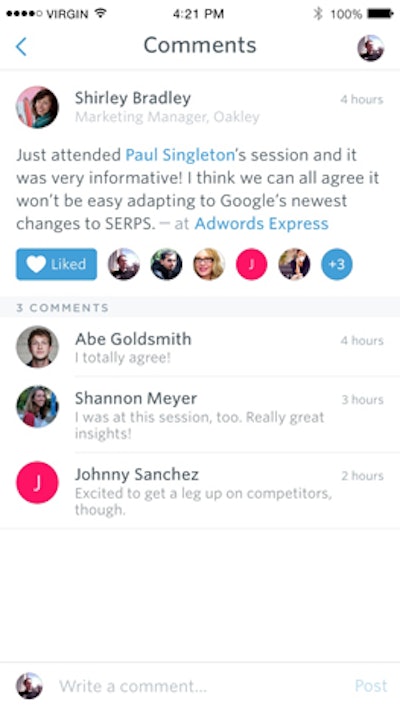
Interact is a feature that launched on Wednesday in all Guidebook app paid plans. Interact allows attendees, sponsors, and planners to connect using Facebook-like social engagement strategies. Users can tag people, tag sessions, and track likes and comments. Each session has a dedicated discussion tab so attendees can share their thoughts on speakers and topics. Sponsor posts, which can include images or links, are integrated into the feed to maximize sponsors’ visibility. Planners can also use the system to track attendee feedback and to provide updates to everyone or to individual attendees.

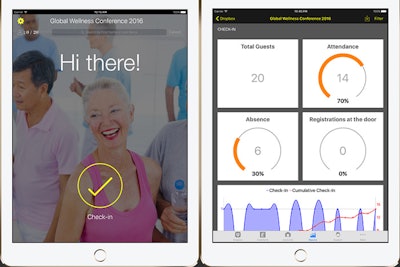
Guesto is a new app that launched in October that allows planners to check in guests and print name tags using an iPad and small label printer. Planners can create custom badges with their event’s logo, and import events and guest lists from Eventbrite or a simple spreadsheet. Guests can be identified for check-in either by searching for their name or by scanning a barcode or QR code.
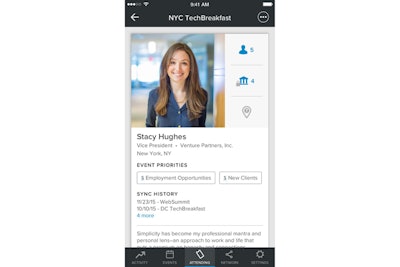
SummitSync is a new iOS and Android app focused on networking. Users log in with their LinkedIn account, select the conferences they will attend, and then anonymously swipe right (interested) or left (not interested) when profiles of other attendees appear. When a mutual connection is made, the two users can message each other in the app to schedule a meeting. Planners can configure the app to ensure that only registered attendees can use the system. They can also sell ads in the app and keep the revenue. SummitSync integrates with email, calendar tools, and customer relationship management systems. In the next few months, an update will allow organizers to add event agendas and floor plans to the app.
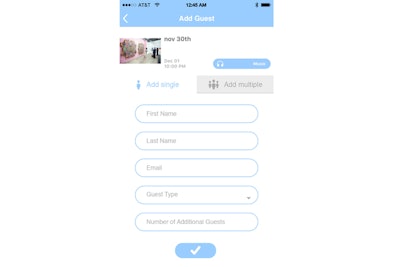
Gjests (pronounced “yasts”) is the Norwegian word for guest. The Web and mobile app launched in beta in July and will be available to everyone in March. Organizers use the Web platform to create their events by adding information such as the event name, location, time, capacity, information for a confirmation email to guests, and whether it is public or private. Hosts also upload their guest list, either manually or by linking an existing list, and then the system sends out invitations. At the event, organizers can use the Gjest mobile app to add guests, scan barcodes to check guests in, and receive notifications when the event is at capacity or when specific guests arrive (for example a V.I.P.). By March, planners will be able to create their events in the app, and the system will also add ticket sales management and the ability to be used in offline mode. Gjests is available for iOS and Android.

Konvene is an iOS and Android app for managing, promoting, and finding events. Hosts create their events in the app, adding information such as description, location, whether it is public or private, and tags such as "meeting" or "birthday party." If the event requires a ticket, the app can manage payments and check-in. Guests can use the app to find events, view the guest list, chat with other attendees, post pictures, or provide a post-event rating of their experience.
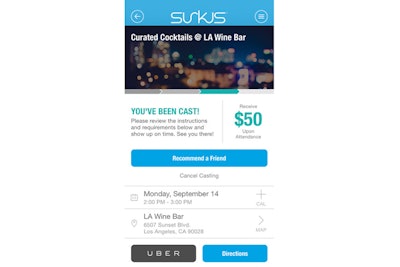
Surkus is an app to help brands, planners, and venues find the right people to attend their events, whether for product launches, brand activations, or red carpet parties. The concept is known as “crowdcasting,” and Surkus chief creative officer Jin Yu says the hope is to make the app the “Uber of curating your exact crowd.” Event hosts use the system to indicate the number and type of guests they are looking for based on interests, demographics, or social media reach. Those interested in attending events create a profile by linking their Facebook account. The system analyzes that person’s likes, friends, interactions, and hashtags and sends them notifications of upcoming events based on that data. Guests are paid a fee to attend, ranging from $5 for Playboy's recent high-profile Super Bowl party to more than $100 for less popular events. The app’s geofencing system automatically checks guests in and out of the event, which allows organizers to see if they stayed the minimum amount to receive payment. In addition to requiring guests to remain on site for a set time, hosts can also require mentions on social media, for example using a hashtag or posting a specific image. Surkus pays the guests via PayPal within 30 minutes of the completion of the event, and then a final bill is sent to the event host. After the event, Surkus sends the organizer a report with pictures of those who attended, their average time on site, and their combined social media reach. Surkus is available for iOS and Android.




















